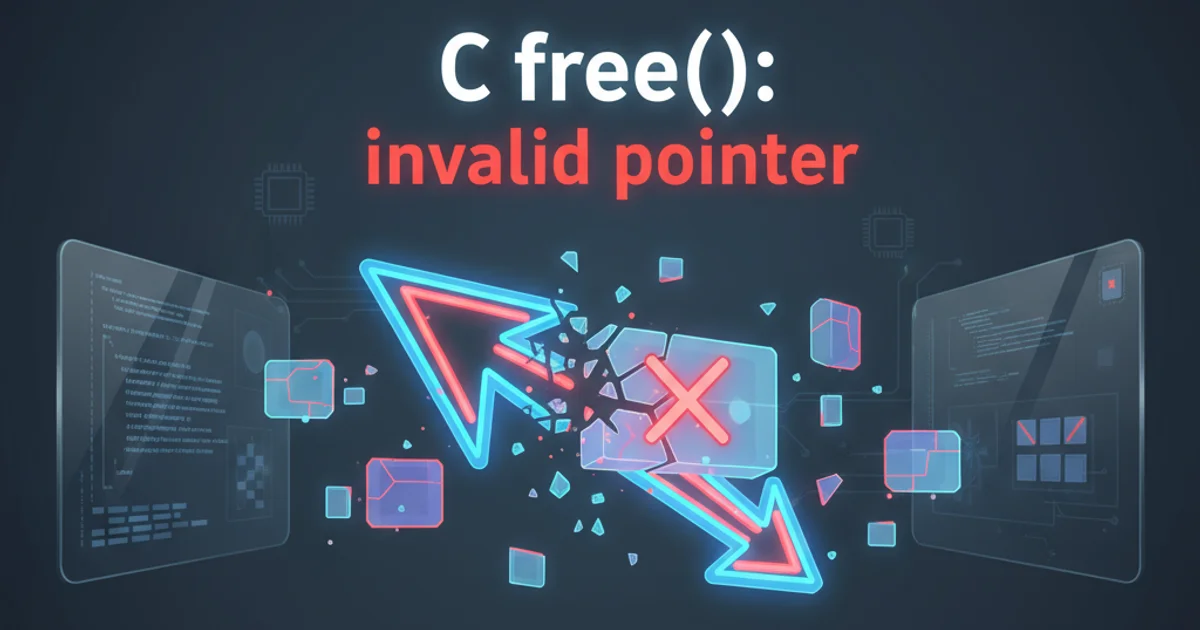C free(): invalid pointer
Categories:
Understanding and Debugging 'C free(): invalid pointer' Errors

Explore the common causes of 'free(): invalid pointer' errors in C programming, learn how to diagnose them using Valgrind, and implement best practices for robust memory management.
The free(): invalid pointer error is a notorious runtime issue in C programming that indicates a fundamental problem with how your program is managing dynamically allocated memory. This error typically occurs when the free() function is called with an argument that is not a valid pointer to memory previously allocated by malloc(), calloc(), or realloc(). Understanding the root causes and employing effective debugging tools are crucial for writing stable and secure C applications.
Common Causes of 'free(): invalid pointer'
This error message is a strong indicator of memory corruption or misuse. It means that the memory management system (often the glibc implementation) has detected an attempt to free memory that it doesn't recognize as a valid, currently allocated block. Here are the most frequent scenarios leading to this error:
1. Double Free
Attempting to free() the same memory block more than once. After the first free(), the memory block is returned to the heap, and the pointer becomes dangling. A subsequent free() on the same pointer will likely cause an invalid pointer error.
2. Freeing Unallocated Memory
Calling free() on a pointer that was never returned by malloc(), calloc(), or realloc(). This could be a pointer to stack memory, global memory, or an arbitrary address.
3. Memory Corruption (Heap Overflows/Underflows)
Writing past the allocated boundaries of a memory block (heap overflow) or before its beginning (heap underflow). This can corrupt the heap's metadata, making it impossible for free() to correctly identify the block when it's later passed for deallocation.
4. Freeing a Pointer to the Middle of a Block
Passing a pointer to free() that points somewhere within an allocated block, but not to its beginning. free() expects the exact address returned by the allocation function.
5. Using a Dangling Pointer After Free
Accessing memory after it has been freed (a 'use-after-free' bug). While this might not immediately cause free(): invalid pointer, subsequent memory allocations or deallocations can corrupt the heap, leading to this error later.
#include <stdio.h>
#include <stdlib.h>
int main() {
int *ptr = (int *)malloc(sizeof(int));
if (ptr == NULL) {
perror("malloc failed");
return 1;
}
*ptr = 10;
printf("Value: %d\n", *ptr);
free(ptr); // First free
// ptr = NULL; // Good practice: set to NULL after freeing
// Attempting to free the same pointer again (double free)
free(ptr); // This will likely cause 'free(): invalid pointer'
return 0;
}
Example of a double free error.
Diagnosing with Valgrind
Debugging free(): invalid pointer errors manually can be incredibly challenging, especially in large codebases, because the error often manifests long after the initial memory corruption occurred. Valgrind, specifically its memcheck tool, is an indispensable utility for detecting memory management errors in C/C++ programs. It instruments your program to catch issues like invalid reads/writes, use-after-free, and double-free errors.
flowchart TD
A[Start Program] --> B{Dynamic Memory Allocation (malloc/calloc/realloc)}
B --> C[Memory Used by Program]
C --> D{Memory Deallocation (free)}
D --> E{Is pointer valid and not previously freed?}
E -- No --> F["free(): invalid pointer" Error]
E -- Yes --> G[Memory Returned to Heap]
F --> H[Program Terminates Abnormally]
G --> I[Continue Program Execution]Flowchart illustrating the path to a 'free(): invalid pointer' error.
-g) when using Valgrind. This allows Valgrind to provide more precise source code locations for detected errors.gcc -g -o myprogram myprogram.c
valgrind --leak-check=full --show-leak-kinds=all --track-origins=yes ./myprogram
Compiling with debug symbols and running Valgrind.
When Valgrind detects a free(): invalid pointer error, it will typically report a Invalid free() or Double free or corruption message, along with a stack trace indicating where the problematic free() call occurred. More importantly, if the error was caused by an earlier memory corruption, Valgrind's --track-origins=yes flag can often pinpoint the exact location where the memory was first corrupted, which is invaluable for debugging.
Best Practices for Preventing Memory Errors
Proactive measures are the best defense against free(): invalid pointer and other memory-related bugs. Adopting these practices can significantly improve the robustness of your C applications:
1. Nullify Pointers After Freeing
Immediately after calling free(ptr), set ptr = NULL;. This prevents accidental double-frees and makes it easier to detect use-after-free attempts (as dereferencing a NULL pointer will cause a segmentation fault, which is easier to debug than heap corruption).
2. Check Return Values of Allocation Functions
Always check if malloc(), calloc(), or realloc() return NULL. Failing to do so can lead to dereferencing a NULL pointer or attempting to free() an invalid address.
3. Match Mallocs with Frees
Ensure that every malloc() (or calloc(), realloc()) has a corresponding free(). This helps prevent memory leaks and ensures proper resource management.
4. Be Mindful of Array Bounds
When working with arrays and pointers, always be careful not to write beyond the allocated boundaries. Use strncpy with size limits, check loop conditions, and calculate buffer sizes carefully.
5. Use Smart Pointers (in C++) or Wrapper Functions (in C)
While C doesn't have built-in smart pointers like C++, you can implement wrapper functions or structures that manage memory lifecycle, ensuring that memory is freed exactly once when it goes out of scope or is no longer needed.
6. Consistent Ownership Semantics
Clearly define which part of your code is responsible for allocating and freeing a particular piece of memory. This prevents confusion and reduces the likelihood of double-frees or memory leaks.
free() memory that was not allocated on the heap (e.g., stack variables or global variables). Doing so will invariably lead to a free(): invalid pointer error or other undefined behavior.